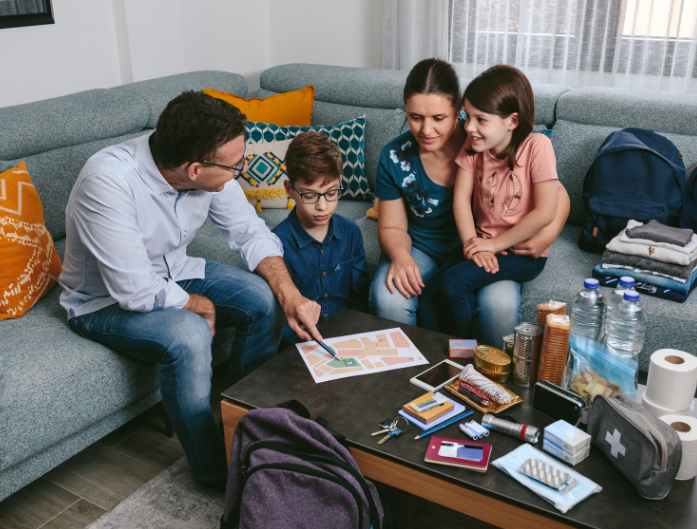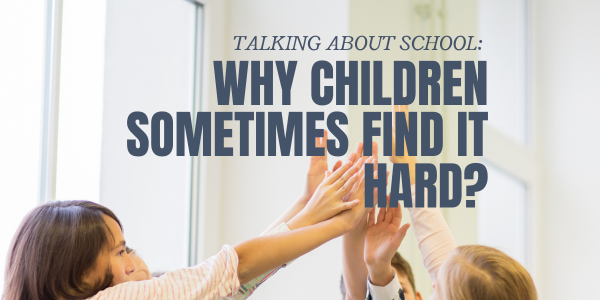Talking about school: Why children sometimes find it hard?
‘How was school?’ is a big question. To answer, your child has to sum up a whole day, and that’s hard for children (and even adults!) to do.
A child might really want to say, ‘My day was so jam-packed with ideas and classes and social stuff that I don’t know where to start’. So it’s easier just to say, ‘OK’.
Some children feel their school experiences are private, so they might not want to share them. This is a typical part of school-age development as children start to shape their own identities and social worlds. But your child still needs to know you’re available when they’re ready to talk.
WHY TALKING ABOUT SCHOOL IS IMPORTANT
Talking with your child about the school day shows you’re interested in what’s going on in their life. This interest boosts your child’s mental health, happiness and wellbeing. It can also have a very positive effect on your child’s behaviour and achievement. It shows your child that you value school and education, which encourages them to value it too.
Talking together about school also helps you get to know more about what’s expected of your child at school, how they learn and how they handle challenges. It can help you understand when your child is feeling less interested in school or having problems.
When you’re in touch with your child’s feelings about school, you’re more likely to see problems before they get too big. This way you can work on overcoming challenges together.
And talking about school issues – like school projects or friendship problems – is also a great chance for you to express your family values about things like teamwork, respect for self and others, friendships, relationships, problem-solving and so on.

STRATEGIES FOR TALKING ABOUT SCHOOL WITH YOUR CHILD
When your child first gets home from school in the afternoon, they’ll probably be tired and hungry or thinking about other things. So easing the transition from school or after-school activities to home can help your child feel more like talking.
It’s best to avoid asking your child a lot of questions straight away – this can be overwhelming for your child. You can just let your child know that you’re glad to see them and talk about non-school topics for a while. Younger children will probably also like unpacking their bags and going through any notes before you ask about school.
Saving questions about homework for later on can also take the pressure off!
Every afternoon or evening will be different. Even if your child usually likes to share their day with you, there’ll be days when they don’t want to talk. Sometimes it’s a matter of sensing ‘your child’s mood and picking the right moment. Some days there might not be a right moment at all, and that’s OK.
Simple, positive and specific questions about parts of the day can get your child talking. It’s good to use questions that invite more than a ‘yes’, ‘no’ or ‘OK’ response. For example:
- What’s the news from school today?
- What was fun?
- What did you like best at school today?
- What does your classroom look like at the moment?
- What did you do in class after recess?
- Who did you hang out with today?
- What subjects did you do today?
- What topics are you working on in science at the moment?

TIPS FOR TALKING ABOUT SCHOOL WITH PRIMARY SCHOOL CHILDREN
These tips can help you get a conversation going:
- Make time to talk. This can often be when you’re doing something with your child. For example, your child might like to talk when you’re walking the dog or preparing dinner together.
- Give your child your full attention if they want to talk with you about their day.
- Take seriously whatever your child tells you. For example, you can say things like, ‘That’s really interesting. Then what happened?’ or ‘And how do you feel about that?’
- Use respectful language when you talk about the school and teachers with or in front of your child. For example, ‘I can see that’s frustrating, but Ms Adams is your teacher and you need to speak respectfully to her’, or ‘Yes, that seems unfair, but perhaps you don’t know the whole story’.
- Use active listening techniques. These can help you pick up on your child’s feelings and work out whether they want to talk.
Your child’s behaviour and communication style might seem to change overnight when they start school. Suddenly everything’s ‘awesome’, or they’re rolling their eyes at everything you say. Your child is learning all kinds of new things from their friends and teachers, so this is part of developing a unique identity.
IDEAS FOR TALKING ABOUT SCHOOL WITH SECONDARY SCHOOL CHILDREN
 As your child develops into the teenage years, they might want more privacy and time to themselves, which can make it harder to talk about school. But this isn’t the end of your warm, close relationship it’s just that getting some distance from you is how your child becomes a more independent individual.
As your child develops into the teenage years, they might want more privacy and time to themselves, which can make it harder to talk about school. But this isn’t the end of your warm, close relationship it’s just that getting some distance from you is how your child becomes a more independent individual.
Stay connected
Staying connected to your child can help you balance respect for their independence and privacy with your need to keep in touch with their life. It can also help you pick up on the moments when your child is ready to talk.
Ask about links between schoolwork and future plans
At this age, your child might be more open to talking about the links between their schoolwork and what they want to do when they finish school.
So rather than asking about your child’s day-to-day activities, you could try focusing on future plans. For example, ‘How’s the webpage you were designing in information technology coming along? Are you still thinking you might want to get into web design after school?’
Look out for signs of problems
Even if you usually have a good relationship with your child, they might not always tell you when they’re having a tough time. If your child is upset or nervous about discussing school or refuses to answer a question, there might be a problem at school.
If you’re worried, you could try talking to other adults who know your child. You could also make an appointment with your child’s year coordinator or the school counsellor to talk about what’s going on.
Stay calm around tricky topics
Conversations with your child about school might bring up tricky topics. Try to stay calm, listen without judgement and focus on how your child is feeling. This is a great chance for you to be supportive and show your child that you value their honesty.
If your child doesn’t want to talk with you about a tricky topic, it might help to find another adult for them to talk with. You could suggest someone they trust and feel comfortable with, like a relative, friend, teacher or counsellor.



